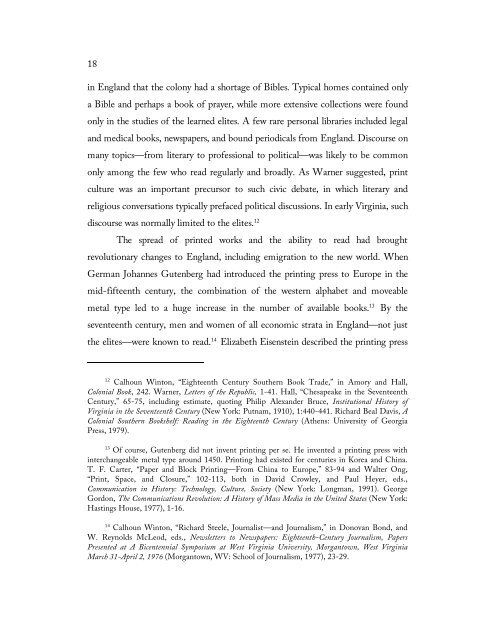The Origins of a Free Press in Prerevolutionary ... - Web Publishing
The Origins of a Free Press in Prerevolutionary ... - Web Publishing
The Origins of a Free Press in Prerevolutionary ... - Web Publishing
You also want an ePaper? Increase the reach of your titles
YUMPU automatically turns print PDFs into web optimized ePapers that Google loves.
18<br />
<strong>in</strong> England that the colony had a shortage <strong>of</strong> Bibles. Typical homes conta<strong>in</strong>ed only<br />
a Bible and perhaps a book <strong>of</strong> prayer, while more extensive collections were found<br />
only <strong>in</strong> the studies <strong>of</strong> the learned elites. A few rare personal libraries <strong>in</strong>cluded legal<br />
and medical books, newspapers, and bound periodicals from England. Discourse on<br />
many topics—from literary to pr<strong>of</strong>essional to political—was likely to be common<br />
only among the few who read regularly and broadly. As Warner suggested, pr<strong>in</strong>t<br />
culture was an important precursor to such civic debate, <strong>in</strong> which literary and<br />
religious conversations typically prefaced political discussions. In early Virg<strong>in</strong>ia, such<br />
discourse was normally limited to the elites. 12<br />
<strong>The</strong> spread <strong>of</strong> pr<strong>in</strong>ted works and the ability to read had brought<br />
revolutionary changes to England, <strong>in</strong>clud<strong>in</strong>g emigration to the new world. When<br />
German Johannes Gutenberg had <strong>in</strong>troduced the pr<strong>in</strong>t<strong>in</strong>g press to Europe <strong>in</strong> the<br />
mid-fifteenth century, the comb<strong>in</strong>ation <strong>of</strong> the western alphabet and moveable<br />
metal type led to a huge <strong>in</strong>crease <strong>in</strong> the number <strong>of</strong> available books. 13 By the<br />
seventeenth century, men and women <strong>of</strong> all economic strata <strong>in</strong> England—not just<br />
the elites—were known to read. 14 Elizabeth Eisenste<strong>in</strong> described the pr<strong>in</strong>t<strong>in</strong>g press<br />
12 Calhoun W<strong>in</strong>ton, “Eighteenth Century Southern Book Trade,” <strong>in</strong> Amory and Hall,<br />
Colonial Book, 242. Warner, Letters <strong>of</strong> the Republic, 1-41. Hall, “Chesapeake <strong>in</strong> the Seventeenth<br />
Century,” 65-75, <strong>in</strong>clud<strong>in</strong>g estimate, quot<strong>in</strong>g Philip Alexander Bruce, Institutional History <strong>of</strong><br />
Virg<strong>in</strong>ia <strong>in</strong> the Seventeenth Century (New York: Putnam, 1910), 1:440-441. Richard Beal Davis, A<br />
Colonial Southern Bookshelf: Read<strong>in</strong>g <strong>in</strong> the Eighteenth Century (Athens: University <strong>of</strong> Georgia<br />
<strong>Press</strong>, 1979).<br />
13 Of course, Gutenberg did not <strong>in</strong>vent pr<strong>in</strong>t<strong>in</strong>g per se. He <strong>in</strong>vented a pr<strong>in</strong>t<strong>in</strong>g press with<br />
<strong>in</strong>terchangeable metal type around 1450. Pr<strong>in</strong>t<strong>in</strong>g had existed for centuries <strong>in</strong> Korea and Ch<strong>in</strong>a.<br />
T. F. Carter, “Paper and Block Pr<strong>in</strong>t<strong>in</strong>g—From Ch<strong>in</strong>a to Europe,” 83-94 and Walter Ong,<br />
“Pr<strong>in</strong>t, Space, and Closure,” 102-113, both <strong>in</strong> David Crowley, and Paul Heyer, eds.,<br />
Communication <strong>in</strong> History: Technology, Culture, Society (New York: Longman, 1991). George<br />
Gordon, <strong>The</strong> Communications Revolution: A History <strong>of</strong> Mass Media <strong>in</strong> the United States (New York:<br />
Hast<strong>in</strong>gs House, 1977), 1-16.<br />
14 Calhoun W<strong>in</strong>ton, “Richard Steele, Journalist—and Journalism,” <strong>in</strong> Donovan Bond, and<br />
W. Reynolds McLeod, eds., Newsletters to Newspapers: Eighteenth-Century Journalism, Papers<br />
Presented at A Bicentennial Symposium at West Virg<strong>in</strong>ia University, Morgantown, West Virg<strong>in</strong>ia<br />
March 31-April 2, 1976 (Morgantown, WV: School <strong>of</strong> Journalism, 1977), 23-29.












